
sdk-python
A model-driven approach to building AI agents in just a few lines of code.
Stars: 5094
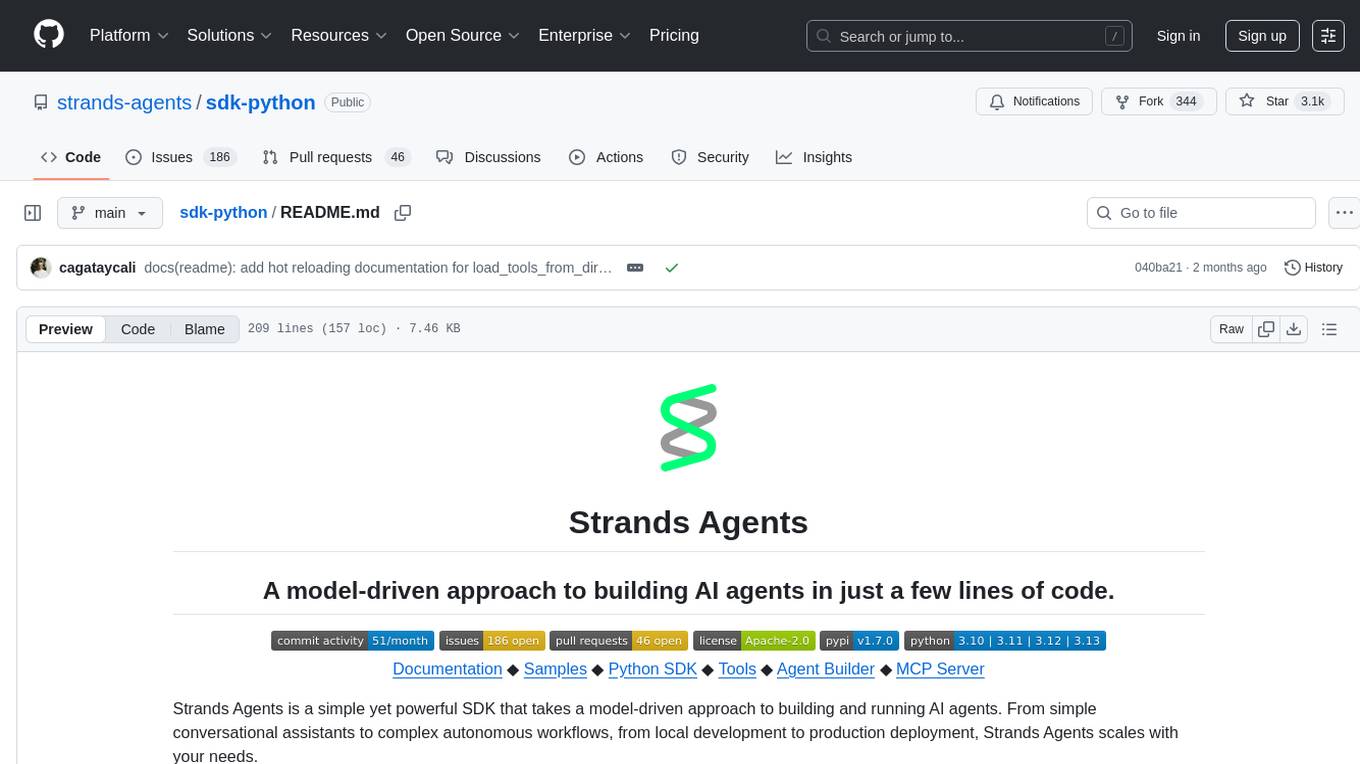
Strands Agents is a lightweight and flexible SDK that takes a model-driven approach to building and running AI agents. It supports various model providers, offers advanced capabilities like multi-agent systems and streaming support, and comes with built-in MCP server support. Users can easily create tools using Python decorators, integrate MCP servers seamlessly, and leverage multiple model providers for different AI tasks. The SDK is designed to scale from simple conversational assistants to complex autonomous workflows, making it suitable for a wide range of AI development needs.
README:
Documentation ◆ Samples ◆ Python SDK ◆ Tools ◆ Agent Builder ◆ MCP Server
Strands Agents is a simple yet powerful SDK that takes a model-driven approach to building and running AI agents. From simple conversational assistants to complex autonomous workflows, from local development to production deployment, Strands Agents scales with your needs.
- Lightweight & Flexible: Simple agent loop that just works and is fully customizable
- Model Agnostic: Support for Amazon Bedrock, Anthropic, Gemini, LiteLLM, Llama, Ollama, OpenAI, Writer, and custom providers
- Advanced Capabilities: Multi-agent systems, autonomous agents, and streaming support
- Built-in MCP: Native support for Model Context Protocol (MCP) servers, enabling access to thousands of pre-built tools
# Install Strands Agents
pip install strands-agents strands-agents-toolsfrom strands import Agent
from strands_tools import calculator
agent = Agent(tools=[calculator])
agent("What is the square root of 1764")Note: For the default Amazon Bedrock model provider, you'll need AWS credentials configured and model access enabled for Claude 4 Sonnet in the us-west-2 region. See the Quickstart Guide for details on configuring other model providers.
Ensure you have Python 3.10+ installed, then:
# Create and activate virtual environment
python -m venv .venv
source .venv/bin/activate # On Windows use: .venv\Scripts\activate
# Install Strands and tools
pip install strands-agents strands-agents-toolsEasily build tools using Python decorators:
from strands import Agent, tool
@tool
def word_count(text: str) -> int:
"""Count words in text.
This docstring is used by the LLM to understand the tool's purpose.
"""
return len(text.split())
agent = Agent(tools=[word_count])
response = agent("How many words are in this sentence?")Hot Reloading from Directory:
Enable automatic tool loading and reloading from the ./tools/ directory:
from strands import Agent
# Agent will watch ./tools/ directory for changes
agent = Agent(load_tools_from_directory=True)
response = agent("Use any tools you find in the tools directory")Seamlessly integrate Model Context Protocol (MCP) servers:
from strands import Agent
from strands.tools.mcp import MCPClient
from mcp import stdio_client, StdioServerParameters
aws_docs_client = MCPClient(
lambda: stdio_client(StdioServerParameters(command="uvx", args=["awslabs.aws-documentation-mcp-server@latest"]))
)
with aws_docs_client:
agent = Agent(tools=aws_docs_client.list_tools_sync())
response = agent("Tell me about Amazon Bedrock and how to use it with Python")Support for various model providers:
from strands import Agent
from strands.models import BedrockModel
from strands.models.ollama import OllamaModel
from strands.models.llamaapi import LlamaAPIModel
from strands.models.gemini import GeminiModel
from strands.models.llamacpp import LlamaCppModel
# Bedrock
bedrock_model = BedrockModel(
model_id="us.amazon.nova-pro-v1:0",
temperature=0.3,
streaming=True, # Enable/disable streaming
)
agent = Agent(model=bedrock_model)
agent("Tell me about Agentic AI")
# Google Gemini
gemini_model = GeminiModel(
client_args={
"api_key": "your_gemini_api_key",
},
model_id="gemini-2.5-flash",
params={"temperature": 0.7}
)
agent = Agent(model=gemini_model)
agent("Tell me about Agentic AI")
# Ollama
ollama_model = OllamaModel(
host="http://localhost:11434",
model_id="llama3"
)
agent = Agent(model=ollama_model)
agent("Tell me about Agentic AI")
# Llama API
llama_model = LlamaAPIModel(
model_id="Llama-4-Maverick-17B-128E-Instruct-FP8",
)
agent = Agent(model=llama_model)
response = agent("Tell me about Agentic AI")Built-in providers:
- Amazon Bedrock
- Anthropic
- Gemini
- Cohere
- LiteLLM
- llama.cpp
- LlamaAPI
- MistralAI
- Ollama
- OpenAI
- SageMaker
- Writer
Custom providers can be implemented using Custom Providers
Strands offers an optional strands-agents-tools package with pre-built tools for quick experimentation:
from strands import Agent
from strands_tools import calculator
agent = Agent(tools=[calculator])
agent("What is the square root of 1764")It's also available on GitHub via strands-agents/tools.
⚠️ Experimental Feature: Bidirectional streaming is currently in experimental status. APIs may change in future releases as we refine the feature based on user feedback and evolving model capabilities.
Build real-time voice and audio conversations with persistent streaming connections. Unlike traditional request-response patterns, bidirectional streaming maintains long-running conversations where users can interrupt, provide continuous input, and receive real-time audio responses. Get started with your first BidiAgent by following the Quickstart guide.
Supported Model Providers:
- Amazon Nova Sonic (v1, v2)
- Google Gemini Live
- OpenAI Realtime API
Quick Example:
import asyncio
from strands.experimental.bidi import BidiAgent
from strands.experimental.bidi.models import BidiNovaSonicModel
from strands.experimental.bidi.io import BidiAudioIO, BidiTextIO
from strands.experimental.bidi.tools import stop_conversation
from strands_tools import calculator
async def main():
# Create bidirectional agent with Nova Sonic v2
model = BidiNovaSonicModel()
agent = BidiAgent(model=model, tools=[calculator, stop_conversation])
# Setup audio and text I/O
audio_io = BidiAudioIO()
text_io = BidiTextIO()
# Run with real-time audio streaming
# Say "stop conversation" to gracefully end the conversation
await agent.run(
inputs=[audio_io.input()],
outputs=[audio_io.output(), text_io.output()]
)
if __name__ == "__main__":
asyncio.run(main())Configuration Options:
from strands.experimental.bidi.models import BidiNovaSonicModel
# Configure audio settings and turn detection (v2 only)
model = BidiNovaSonicModel(
provider_config={
"audio": {
"input_rate": 16000,
"output_rate": 16000,
"voice": "matthew"
},
"turn_detection": {
"endpointingSensitivity": "MEDIUM" # HIGH, MEDIUM, or LOW
},
"inference": {
"max_tokens": 2048,
"temperature": 0.7
}
}
)
# Configure I/O devices
audio_io = BidiAudioIO(
input_device_index=0, # Specific microphone
output_device_index=1, # Specific speaker
input_buffer_size=10,
output_buffer_size=10
)
# Text input mode (type messages instead of speaking)
text_io = BidiTextIO()
await agent.run(
inputs=[text_io.input()], # Use text input
outputs=[audio_io.output(), text_io.output()]
)
# Multi-modal: Both audio and text input
await agent.run(
inputs=[audio_io.input(), text_io.input()], # Speak OR type
outputs=[audio_io.output(), text_io.output()]
)For detailed guidance & examples, explore our documentation:
We welcome contributions! See our Contributing Guide for details on:
- Reporting bugs & features
- Development setup
- Contributing via Pull Requests
- Code of Conduct
- Reporting of security issues
This project is licensed under the Apache License 2.0 - see the LICENSE file for details.
See CONTRIBUTING for more information.
For Tasks:
Click tags to check more tools for each tasksFor Jobs:
Alternative AI tools for sdk-python
Similar Open Source Tools

sdk-python
Strands Agents is a lightweight and flexible SDK that takes a model-driven approach to building and running AI agents. It supports various model providers, offers advanced capabilities like multi-agent systems and streaming support, and comes with built-in MCP server support. Users can easily create tools using Python decorators, integrate MCP servers seamlessly, and leverage multiple model providers for different AI tasks. The SDK is designed to scale from simple conversational assistants to complex autonomous workflows, making it suitable for a wide range of AI development needs.
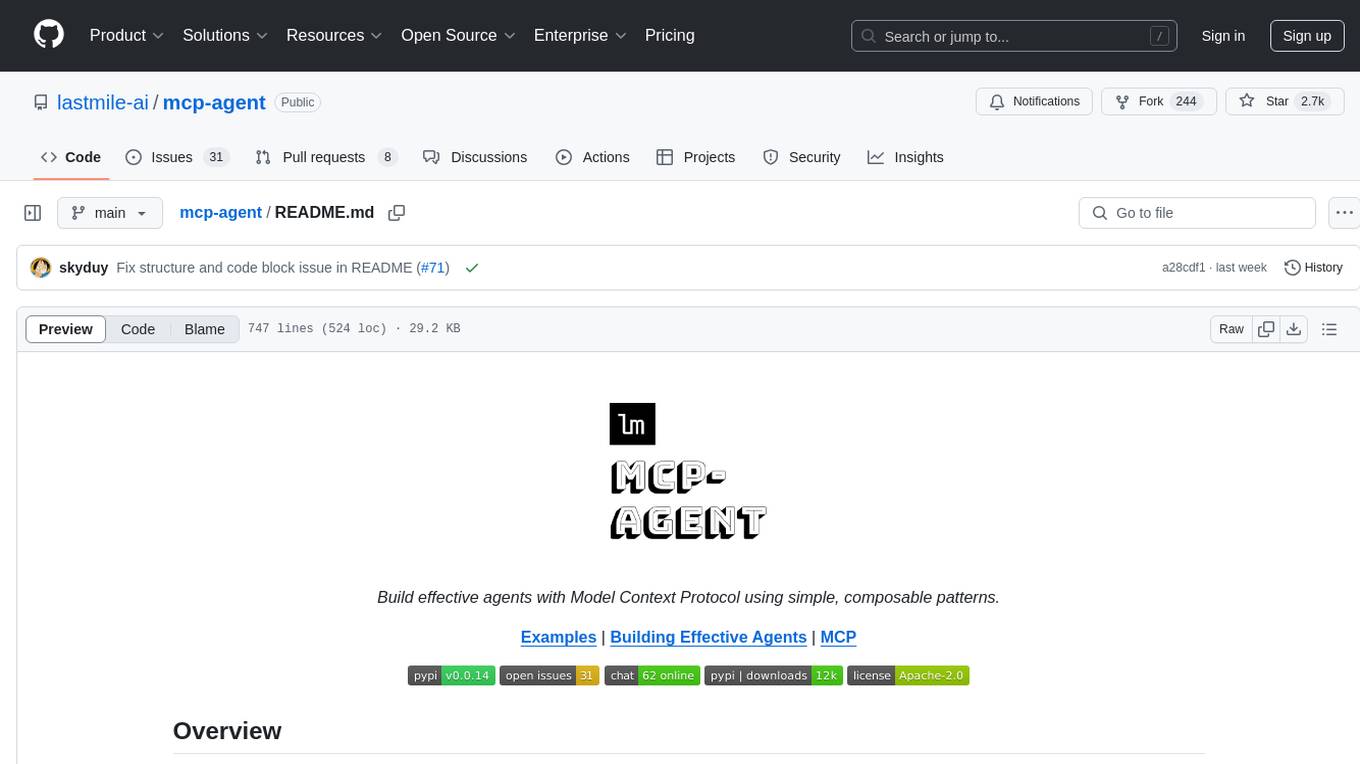
mcp-agent
mcp-agent is a simple, composable framework designed to build agents using the Model Context Protocol. It handles the lifecycle of MCP server connections and implements patterns for building production-ready AI agents in a composable way. The framework also includes OpenAI's Swarm pattern for multi-agent orchestration in a model-agnostic manner, making it the simplest way to build robust agent applications. It is purpose-built for the shared protocol MCP, lightweight, and closer to an agent pattern library than a framework. mcp-agent allows developers to focus on the core business logic of their AI applications by handling mechanics such as server connections, working with LLMs, and supporting external signals like human input.
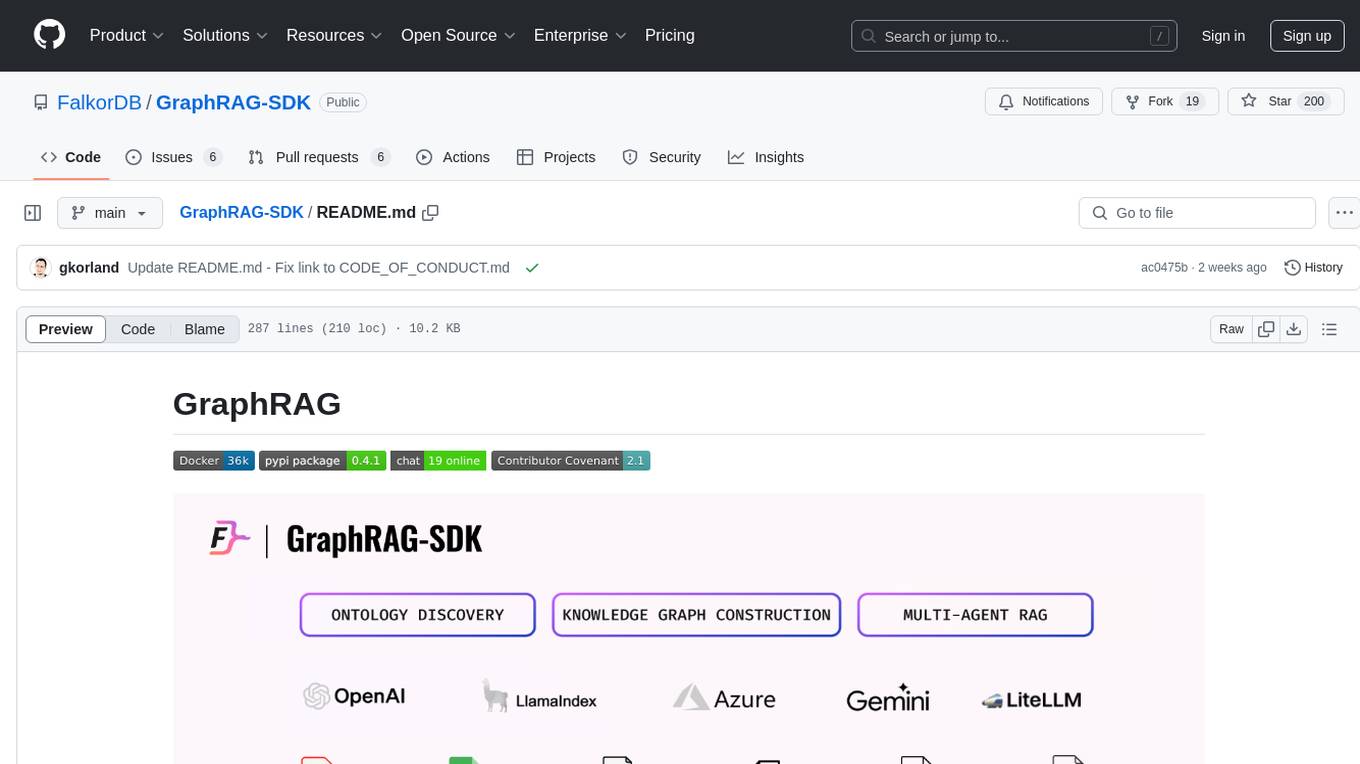
GraphRAG-SDK
Build fast and accurate GenAI applications with GraphRAG SDK, a specialized toolkit for building Graph Retrieval-Augmented Generation (GraphRAG) systems. It integrates knowledge graphs, ontology management, and state-of-the-art LLMs to deliver accurate, efficient, and customizable RAG workflows. The SDK simplifies the development process by automating ontology creation, knowledge graph agent creation, and query handling, enabling users to interact and query their knowledge graphs effectively. It supports multi-agent systems and orchestrates agents specialized in different domains. The SDK is optimized for FalkorDB, ensuring high performance and scalability for large-scale applications. By leveraging knowledge graphs, it enables semantic relationships and ontology-driven queries that go beyond standard vector similarity, enhancing retrieval-augmented generation capabilities.
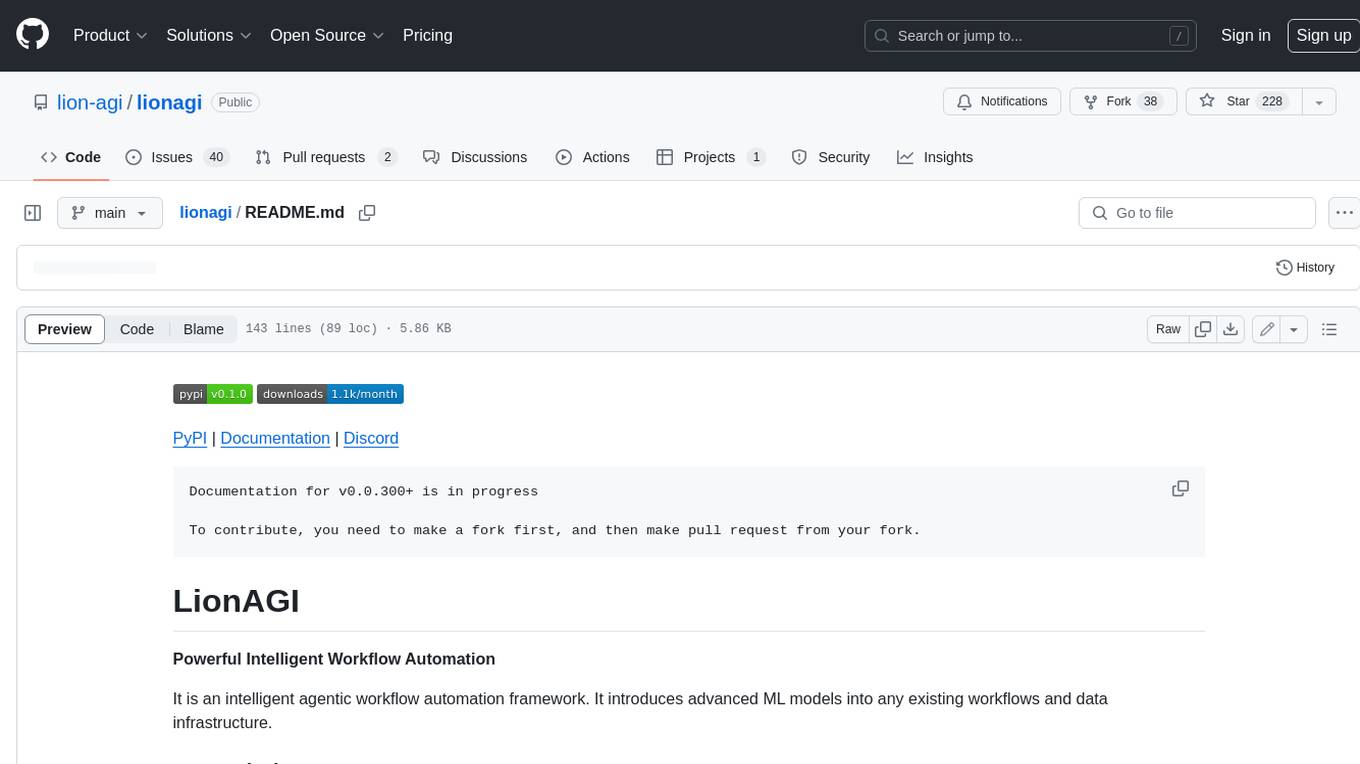
lionagi
LionAGI is a powerful intelligent workflow automation framework that introduces advanced ML models into any existing workflows and data infrastructure. It can interact with almost any model, run interactions in parallel for most models, produce structured pydantic outputs with flexible usage, automate workflow via graph based agents, use advanced prompting techniques, and more. LionAGI aims to provide a centralized agent-managed framework for "ML-powered tools coordination" and to dramatically lower the barrier of entries for creating use-case/domain specific tools. It is designed to be asynchronous only and requires Python 3.10 or higher.

semantic-kernel
Semantic Kernel is an SDK that integrates Large Language Models (LLMs) like OpenAI, Azure OpenAI, and Hugging Face with conventional programming languages like C#, Python, and Java. Semantic Kernel achieves this by allowing you to define plugins that can be chained together in just a few lines of code. What makes Semantic Kernel _special_ , however, is its ability to _automatically_ orchestrate plugins with AI. With Semantic Kernel planners, you can ask an LLM to generate a plan that achieves a user's unique goal. Afterwards, Semantic Kernel will execute the plan for the user.
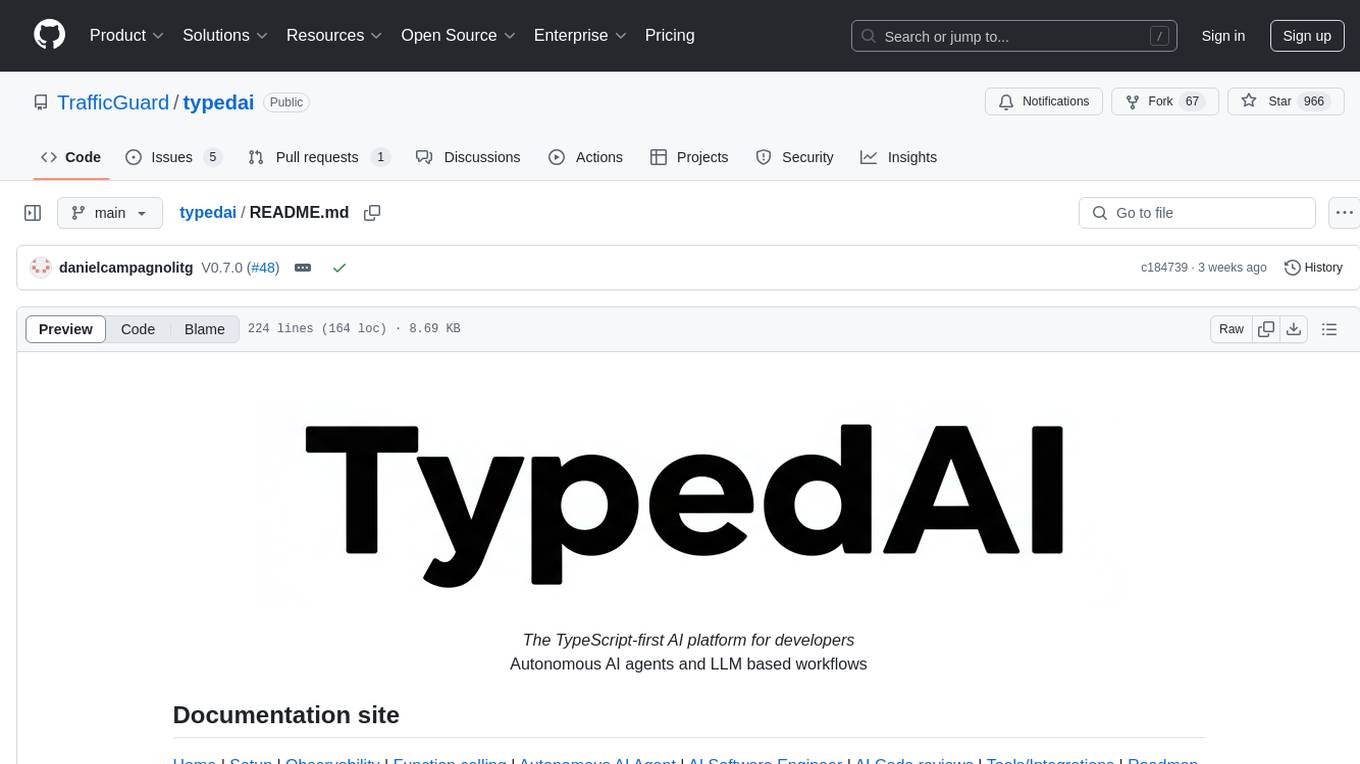
typedai
TypedAI is a TypeScript-first AI platform designed for developers to create and run autonomous AI agents, LLM based workflows, and chatbots. It offers advanced autonomous agents, software developer agents, pull request code review agent, AI chat interface, Slack chatbot, and supports various LLM services. The platform features configurable Human-in-the-loop settings, functional callable tools/integrations, CLI and Web UI interface, and can be run locally or deployed on the cloud with multi-user/SSO support. It leverages the Python AI ecosystem through executing Python scripts/packages and provides flexible run/deploy options like single user mode, Firestore & Cloud Run deployment, and multi-user SSO enterprise deployment. TypedAI also includes UI examples, code examples, and automated LLM function schemas for seamless development and execution of AI workflows.

rl
TorchRL is an open-source Reinforcement Learning (RL) library for PyTorch. It provides pytorch and **python-first** , low and high level abstractions for RL that are intended to be **efficient** , **modular** , **documented** and properly **tested**. The code is aimed at supporting research in RL. Most of it is written in python in a highly modular way, such that researchers can easily swap components, transform them or write new ones with little effort.
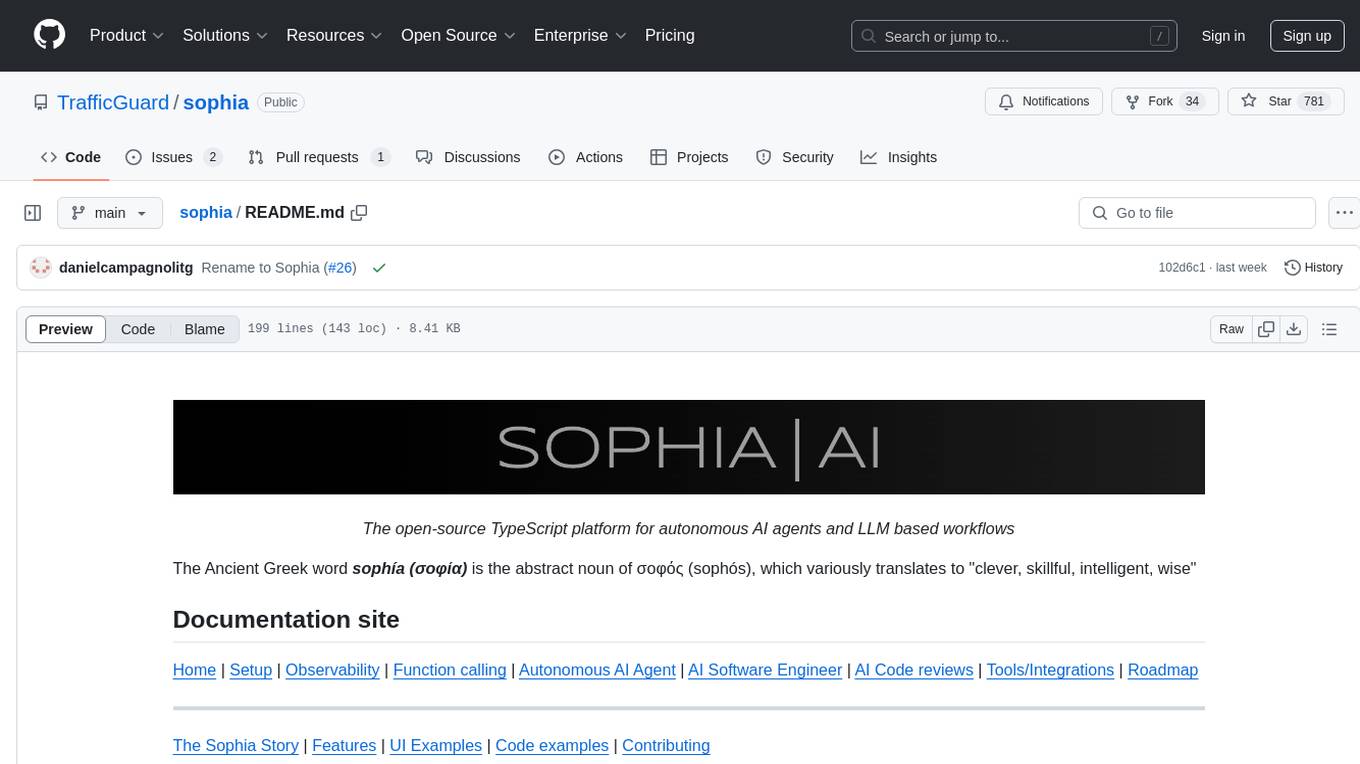
sophia
Sophia is an open-source TypeScript platform designed for autonomous AI agents and LLM based workflows. It aims to automate processes, review code, assist with refactorings, and support various integrations. The platform offers features like advanced autonomous agents, reasoning/planning inspired by Google's Self-Discover paper, memory and function call history, adaptive iterative planning, and more. Sophia supports multiple LLMs/services, CLI and web interface, human-in-the-loop interactions, flexible deployment options, observability with OpenTelemetry tracing, and specific agents for code editing, software engineering, and code review. It provides a flexible platform for the TypeScript community to expand and support various use cases and integrations.
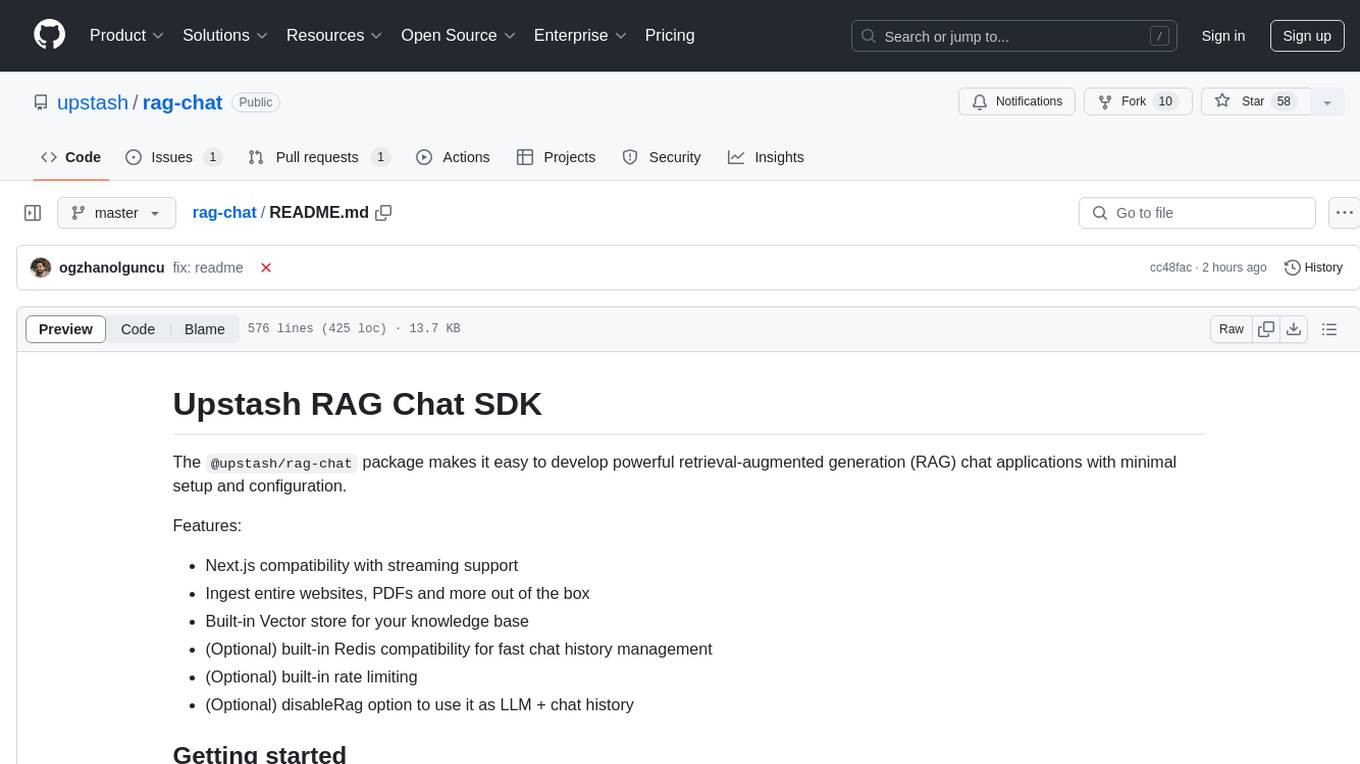
rag-chat
The `@upstash/rag-chat` package simplifies the development of retrieval-augmented generation (RAG) chat applications by providing Next.js compatibility with streaming support, built-in vector store, optional Redis compatibility for fast chat history management, rate limiting, and disableRag option. Users can easily set up the environment variables and initialize RAGChat to interact with AI models, manage knowledge base, chat history, and enable debugging features. Advanced configuration options allow customization of RAGChat instance with built-in rate limiting, observability via Helicone, and integration with Next.js route handlers and Vercel AI SDK. The package supports OpenAI models, Upstash-hosted models, and custom providers like TogetherAi and Replicate.
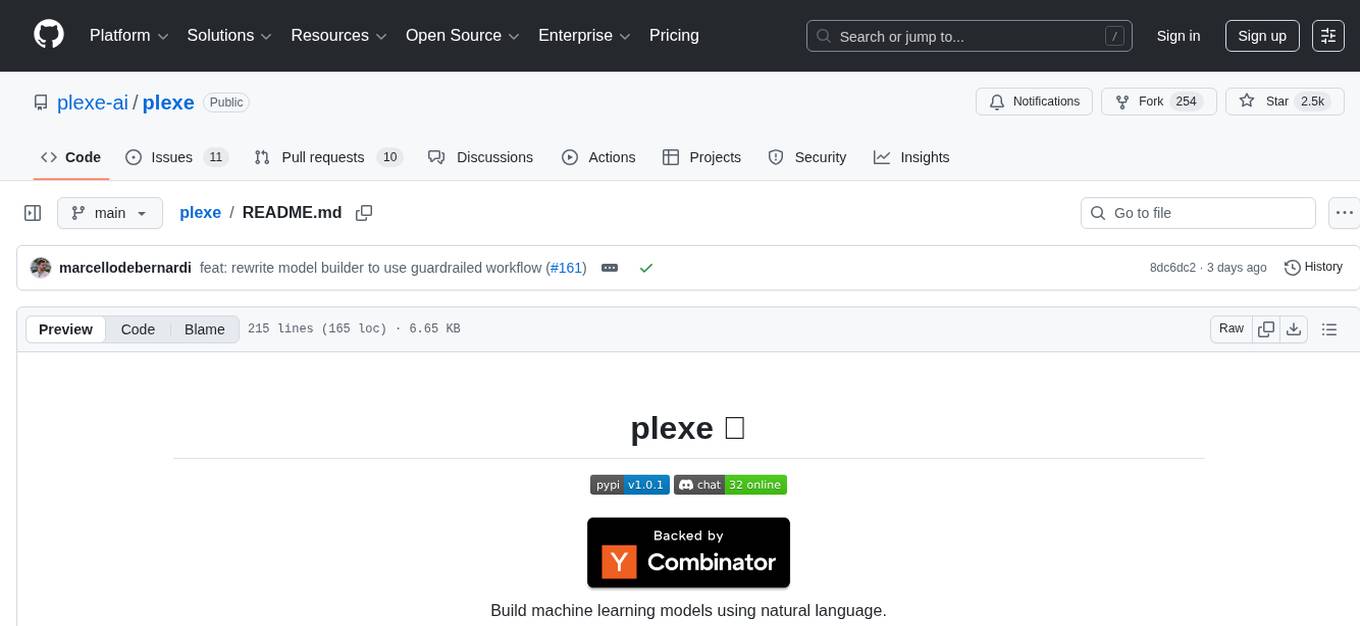
plexe
Plexe is a tool that allows users to create machine learning models by describing them in plain language. Users can explain their requirements, provide a dataset, and the AI-powered system will build a fully functional model through an automated agentic approach. It supports multiple AI agents and model building frameworks like XGBoost, CatBoost, and Keras. Plexe also provides Docker images with pre-configured environments, YAML configuration for customization, and support for multiple LiteLLM providers. Users can visualize experiment results using the built-in Streamlit dashboard and extend Plexe's functionality through custom integrations.
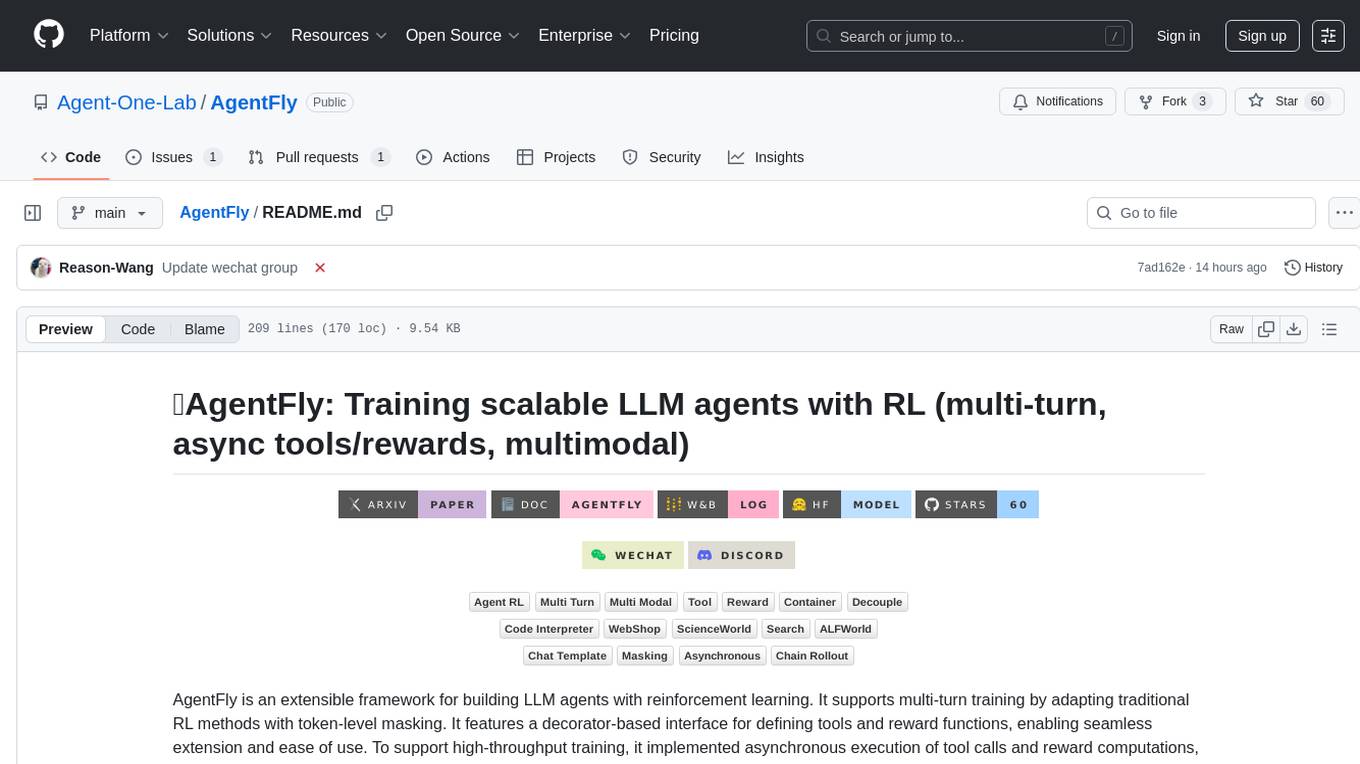
AgentFly
AgentFly is an extensible framework for building LLM agents with reinforcement learning. It supports multi-turn training by adapting traditional RL methods with token-level masking. It features a decorator-based interface for defining tools and reward functions, enabling seamless extension and ease of use. To support high-throughput training, it implemented asynchronous execution of tool calls and reward computations, and designed a centralized resource management system for scalable environment coordination. A suite of prebuilt tools and environments are provided.
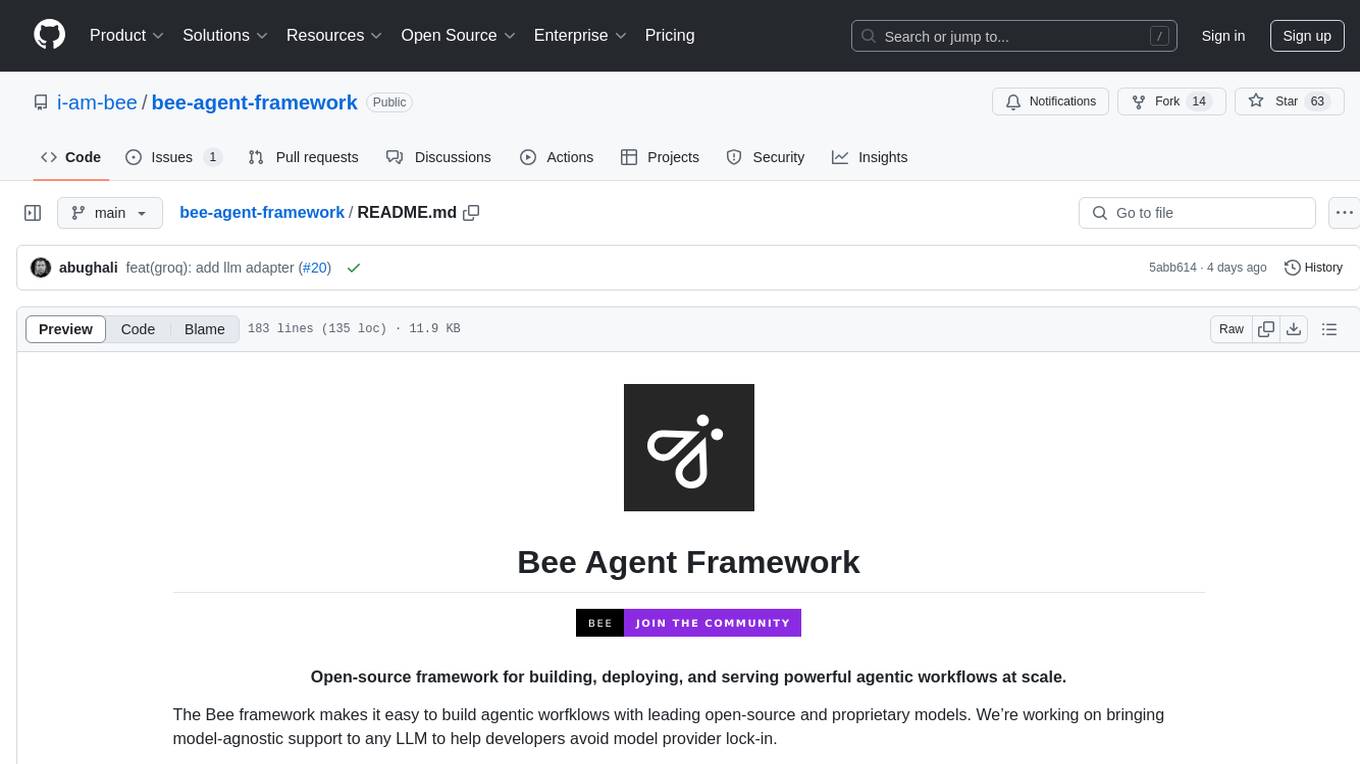
bee-agent-framework
The Bee Agent Framework is an open-source tool for building, deploying, and serving powerful agentic workflows at scale. It provides AI agents, tools for creating workflows in Javascript/Python, a code interpreter, memory optimization strategies, serialization for pausing/resuming workflows, traceability features, production-level control, and upcoming features like model-agnostic support and a chat UI. The framework offers various modules for agents, llms, memory, tools, caching, errors, adapters, logging, serialization, and more, with a roadmap including MLFlow integration, JSON support, structured outputs, chat client, base agent improvements, guardrails, and evaluation.
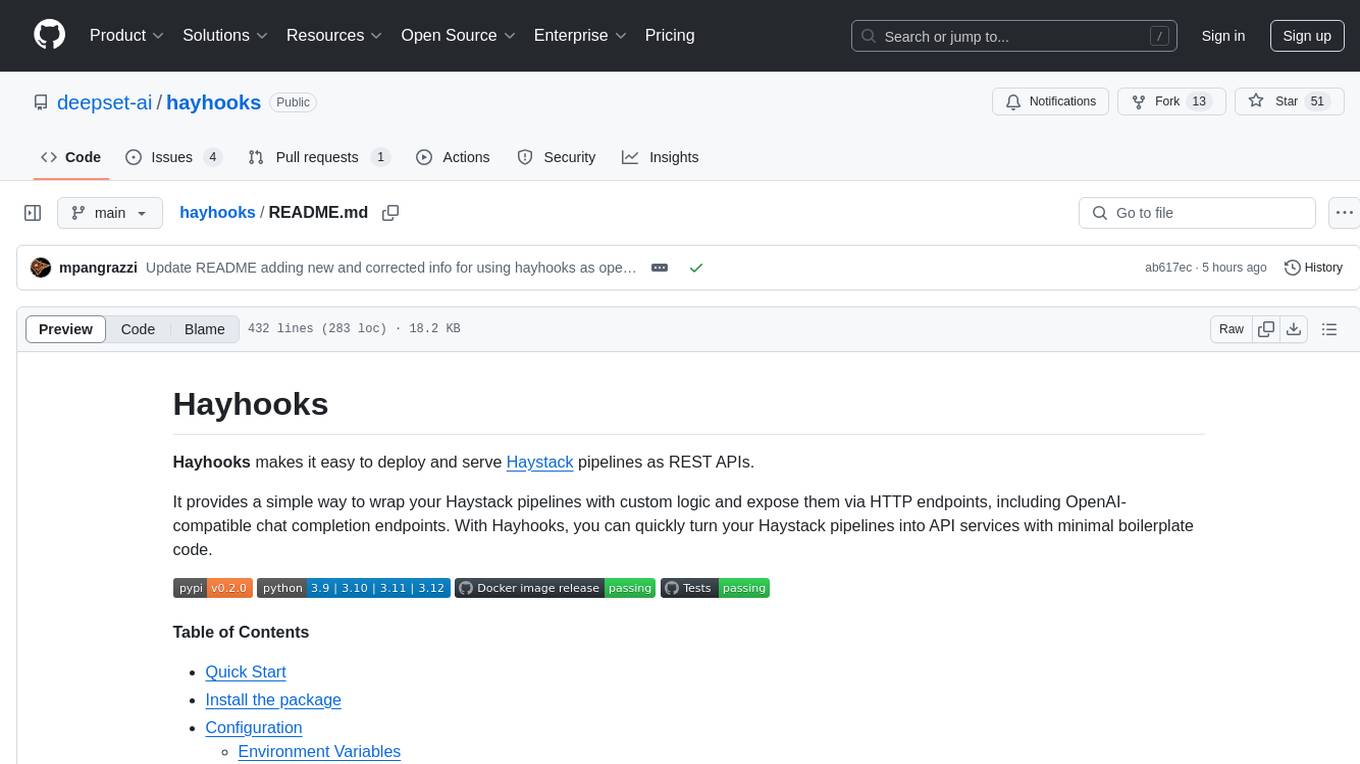
hayhooks
Hayhooks is a tool that simplifies the deployment and serving of Haystack pipelines as REST APIs. It allows users to wrap their pipelines with custom logic and expose them via HTTP endpoints, including OpenAI-compatible chat completion endpoints. With Hayhooks, users can easily convert their Haystack pipelines into API services with minimal boilerplate code.
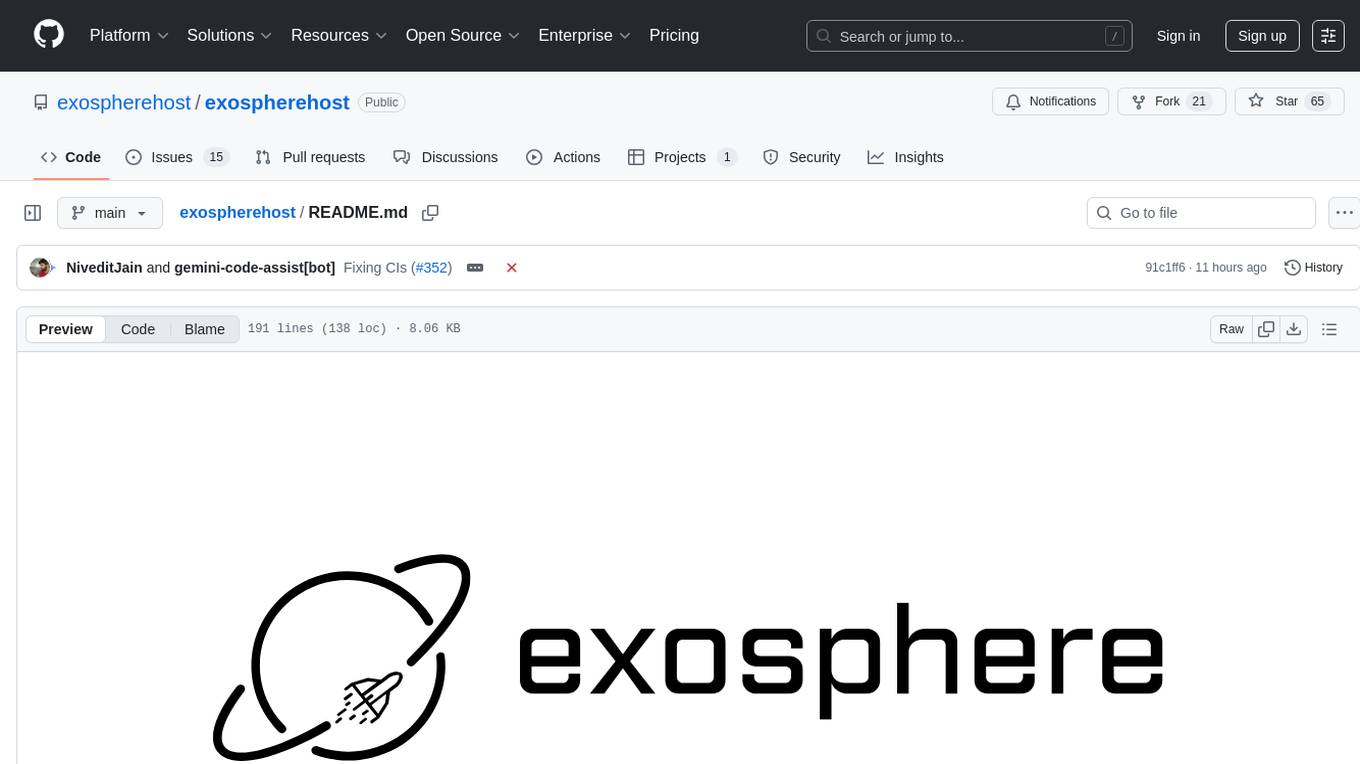
exospherehost
Exosphere is an open source infrastructure designed to run AI agents at scale for large data and long running flows. It allows developers to define plug and playable nodes that can be run on a reliable backbone in the form of a workflow, with features like dynamic state creation at runtime, infinite parallel agents, persistent state management, and failure handling. This enables the deployment of production agents that can scale beautifully to build robust autonomous AI workflows.

crawl4ai
Crawl4AI is a powerful and free web crawling service that extracts valuable data from websites and provides LLM-friendly output formats. It supports crawling multiple URLs simultaneously, replaces media tags with ALT, and is completely free to use and open-source. Users can integrate Crawl4AI into Python projects as a library or run it as a standalone local server. The tool allows users to crawl and extract data from specified URLs using different providers and models, with options to include raw HTML content, force fresh crawls, and extract meaningful text blocks. Configuration settings can be adjusted in the `crawler/config.py` file to customize providers, API keys, chunk processing, and word thresholds. Contributions to Crawl4AI are welcome from the open-source community to enhance its value for AI enthusiasts and developers.
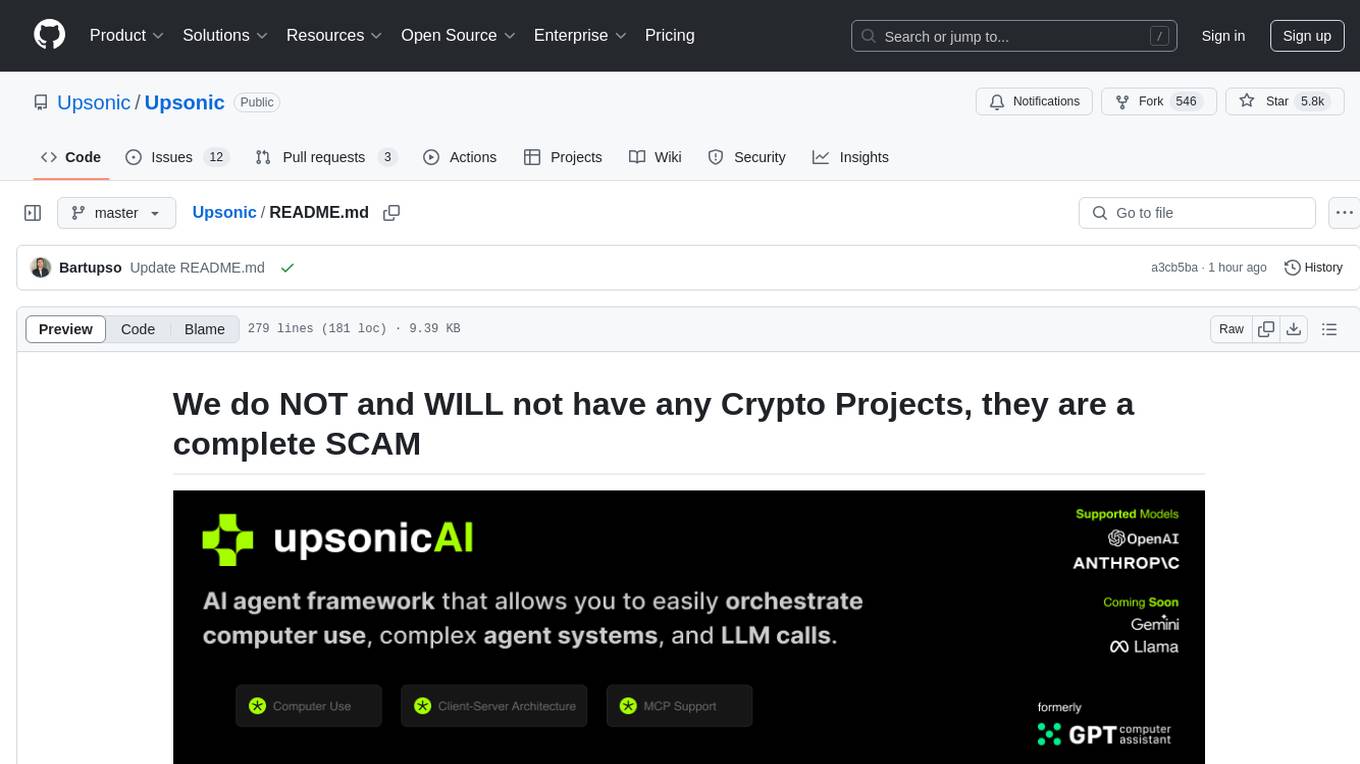
gpt-computer-assistant
GPT Computer Assistant (GCA) is an open-source framework designed to build vertical AI agents that can automate tasks on Windows, macOS, and Ubuntu systems. It leverages the Model Context Protocol (MCP) and its own modules to mimic human-like actions and achieve advanced capabilities. With GCA, users can empower themselves to accomplish more in less time by automating tasks like updating dependencies, analyzing databases, and configuring cloud security settings.
For similar tasks

OpenAGI
OpenAGI is an AI agent creation package designed for researchers and developers to create intelligent agents using advanced machine learning techniques. The package provides tools and resources for building and training AI models, enabling users to develop sophisticated AI applications. With a focus on collaboration and community engagement, OpenAGI aims to facilitate the integration of AI technologies into various domains, fostering innovation and knowledge sharing among experts and enthusiasts.

GPTSwarm
GPTSwarm is a graph-based framework for LLM-based agents that enables the creation of LLM-based agents from graphs and facilitates the customized and automatic self-organization of agent swarms with self-improvement capabilities. The library includes components for domain-specific operations, graph-related functions, LLM backend selection, memory management, and optimization algorithms to enhance agent performance and swarm efficiency. Users can quickly run predefined swarms or utilize tools like the file analyzer. GPTSwarm supports local LM inference via LM Studio, allowing users to run with a local LLM model. The framework has been accepted by ICML2024 and offers advanced features for experimentation and customization.

AgentForge
AgentForge is a low-code framework tailored for the rapid development, testing, and iteration of AI-powered autonomous agents and Cognitive Architectures. It is compatible with a range of LLM models and offers flexibility to run different models for different agents based on specific needs. The framework is designed for seamless extensibility and database-flexibility, making it an ideal playground for various AI projects. AgentForge is a beta-testing ground and future-proof hub for crafting intelligent, model-agnostic autonomous agents.

atomic_agents
Atomic Agents is a modular and extensible framework designed for creating powerful applications. It follows the principles of Atomic Design, emphasizing small and single-purpose components. Leveraging Pydantic for data validation and serialization, the framework offers a set of tools and agents that can be combined to build AI applications. It depends on the Instructor package and supports various APIs like OpenAI, Cohere, Anthropic, and Gemini. Atomic Agents is suitable for developers looking to create AI agents with a focus on modularity and flexibility.
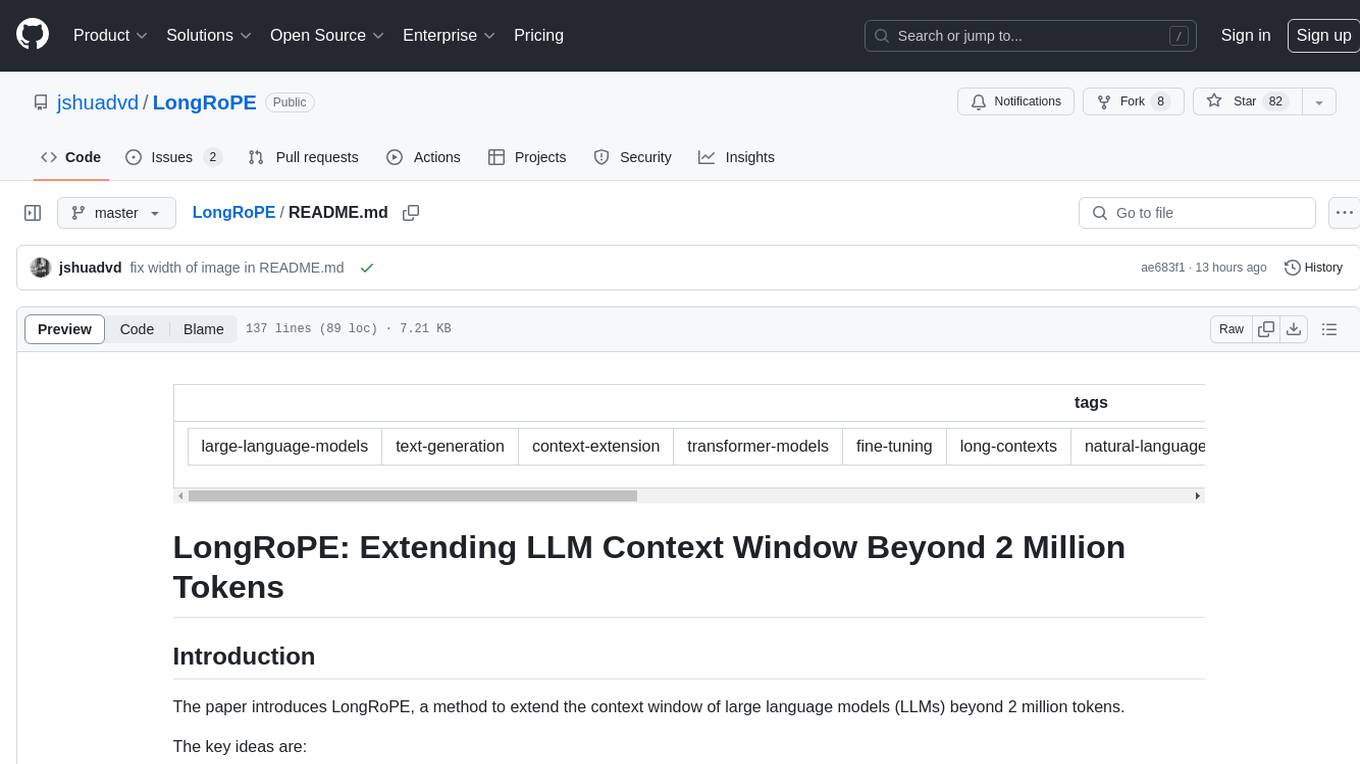
LongRoPE
LongRoPE is a method to extend the context window of large language models (LLMs) beyond 2 million tokens. It identifies and exploits non-uniformities in positional embeddings to enable 8x context extension without fine-tuning. The method utilizes a progressive extension strategy with 256k fine-tuning to reach a 2048k context. It adjusts embeddings for shorter contexts to maintain performance within the original window size. LongRoPE has been shown to be effective in maintaining performance across various tasks from 4k to 2048k context lengths.

ax
Ax is a Typescript library that allows users to build intelligent agents inspired by agentic workflows and the Stanford DSP paper. It seamlessly integrates with multiple Large Language Models (LLMs) and VectorDBs to create RAG pipelines or collaborative agents capable of solving complex problems. The library offers advanced features such as streaming validation, multi-modal DSP, and automatic prompt tuning using optimizers. Users can easily convert documents of any format to text, perform smart chunking, embedding, and querying, and ensure output validation while streaming. Ax is production-ready, written in Typescript, and has zero dependencies.
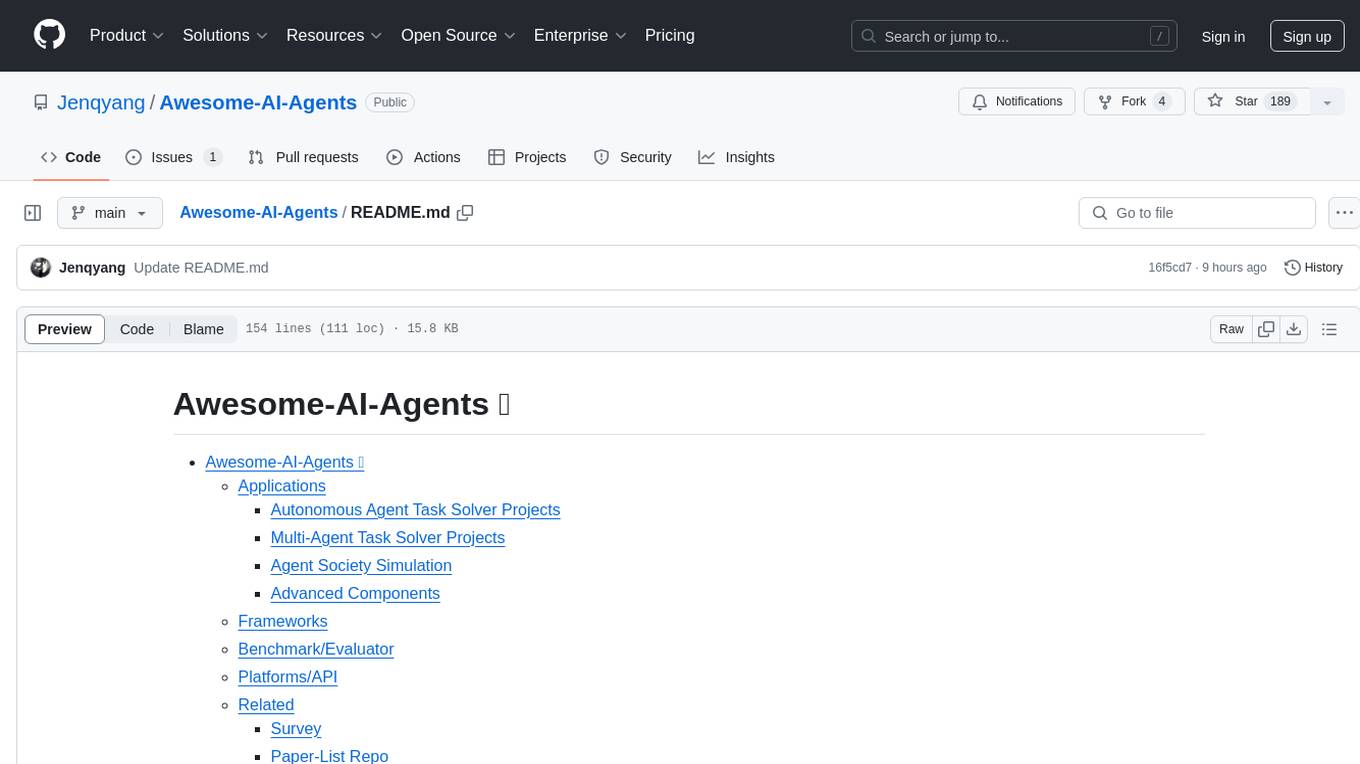
Awesome-AI-Agents
Awesome-AI-Agents is a curated list of projects, frameworks, benchmarks, platforms, and related resources focused on autonomous AI agents powered by Large Language Models (LLMs). The repository showcases a wide range of applications, multi-agent task solver projects, agent society simulations, and advanced components for building and customizing AI agents. It also includes frameworks for orchestrating role-playing, evaluating LLM-as-Agent performance, and connecting LLMs with real-world applications through platforms and APIs. Additionally, the repository features surveys, paper lists, and blogs related to LLM-based autonomous agents, making it a valuable resource for researchers, developers, and enthusiasts in the field of AI.

CodeFuse-muAgent
CodeFuse-muAgent is a Multi-Agent framework designed to streamline Standard Operating Procedure (SOP) orchestration for agents. It integrates toolkits, code libraries, knowledge bases, and sandbox environments for rapid construction of complex Multi-Agent interactive applications. The framework enables efficient execution and handling of multi-layered and multi-dimensional tasks.
For similar jobs

sweep
Sweep is an AI junior developer that turns bugs and feature requests into code changes. It automatically handles developer experience improvements like adding type hints and improving test coverage.

teams-ai
The Teams AI Library is a software development kit (SDK) that helps developers create bots that can interact with Teams and Microsoft 365 applications. It is built on top of the Bot Framework SDK and simplifies the process of developing bots that interact with Teams' artificial intelligence capabilities. The SDK is available for JavaScript/TypeScript, .NET, and Python.

ai-guide
This guide is dedicated to Large Language Models (LLMs) that you can run on your home computer. It assumes your PC is a lower-end, non-gaming setup.

classifai
Supercharge WordPress Content Workflows and Engagement with Artificial Intelligence. Tap into leading cloud-based services like OpenAI, Microsoft Azure AI, Google Gemini and IBM Watson to augment your WordPress-powered websites. Publish content faster while improving SEO performance and increasing audience engagement. ClassifAI integrates Artificial Intelligence and Machine Learning technologies to lighten your workload and eliminate tedious tasks, giving you more time to create original content that matters.

chatbot-ui
Chatbot UI is an open-source AI chat app that allows users to create and deploy their own AI chatbots. It is easy to use and can be customized to fit any need. Chatbot UI is perfect for businesses, developers, and anyone who wants to create a chatbot.

BricksLLM
BricksLLM is a cloud native AI gateway written in Go. Currently, it provides native support for OpenAI, Anthropic, Azure OpenAI and vLLM. BricksLLM aims to provide enterprise level infrastructure that can power any LLM production use cases. Here are some use cases for BricksLLM: * Set LLM usage limits for users on different pricing tiers * Track LLM usage on a per user and per organization basis * Block or redact requests containing PIIs * Improve LLM reliability with failovers, retries and caching * Distribute API keys with rate limits and cost limits for internal development/production use cases * Distribute API keys with rate limits and cost limits for students

uAgents
uAgents is a Python library developed by Fetch.ai that allows for the creation of autonomous AI agents. These agents can perform various tasks on a schedule or take action on various events. uAgents are easy to create and manage, and they are connected to a fast-growing network of other uAgents. They are also secure, with cryptographically secured messages and wallets.

griptape
Griptape is a modular Python framework for building AI-powered applications that securely connect to your enterprise data and APIs. It offers developers the ability to maintain control and flexibility at every step. Griptape's core components include Structures (Agents, Pipelines, and Workflows), Tasks, Tools, Memory (Conversation Memory, Task Memory, and Meta Memory), Drivers (Prompt and Embedding Drivers, Vector Store Drivers, Image Generation Drivers, Image Query Drivers, SQL Drivers, Web Scraper Drivers, and Conversation Memory Drivers), Engines (Query Engines, Extraction Engines, Summary Engines, Image Generation Engines, and Image Query Engines), and additional components (Rulesets, Loaders, Artifacts, Chunkers, and Tokenizers). Griptape enables developers to create AI-powered applications with ease and efficiency.





